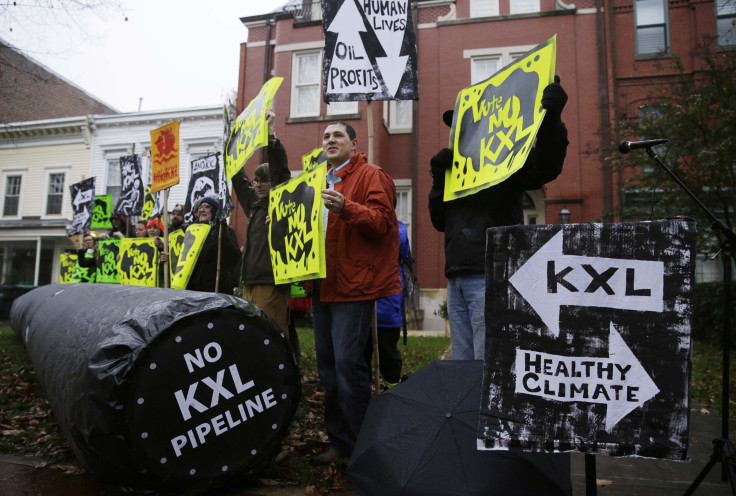Keystone XL Pipeline Fails To Win Senate Approval

WASHINGTON -- The controversial Keystone XL pipeline fell short of the needed 60 votes to gain approval in the Senate, a blow to Louisiana Sen. Mary Landrieu, the bill's sponsor, who is desperately trying to hold onto her seat. The vote was 59-41. After years of refusal to allow a vote in the Senate, Democrats stepped aside only to watch the bill die on the floor in a Tuesday evening vote.
The pipeline, which would carry crude oil from Canada to the Gulf Coast, has long been a powerful symbolic issue. Republicans have hailed it as a job creation project, arguing it will decrease U.S. dependence on foreign oil and provide a safe means to transport crude oil from the nation’s northern neighbors. Democrats have argued the project remains dangerous, at risk of spilling a heavy, nasty type of oil in America’s heartland, and will only entrench dependence on fossil fuels.
Democrats in the Senate have blocked efforts to hold a vote in the upper chamber. But with Landrieu desperately fighting to keep her Senate seat, leadership let her hold a vote on the project, which is popular in her home state. The bill had already passed the House, which took its ninth vote last week to approve the Keystone pipeline.
Landrieu was working the phones, calling and sending text messages, in the lead up to the vote, making an aggressive effort to win over a 60th vote among those who she thought were persuadable.
The Tuesday afternoon party lunch, where the senators meet with their caucuses to talk policy, was described as "brutal" by an aide with knowledge of the meeting. Landrieu made an impassioned plea to fellow Democrats to back the bill, but opponents strongly rejected her position.
The defeat of the bill only delays the point at which Obama must decide whether to veto the pipeline. The president will undoubtedly face the choice again next year. Passing a Keystone authorization has been high on the GOP priority list for the next Congress, when Republicans will control both chambers.
Congressional action was never needed; Obama could have approved the project years ago. (Because the pipeline crosses an international border, it needs presidential approval.) The votes were designed to pressure him to take action on the project since he has refused so far to sign off, citing environmental concerns about potential leaks, deepened dependence on fossil fuels and the potential it could undermine efforts to address climate change.
The defeat sets up a fight on the issue in 2015. The pipeline has been a favorite GOP talking point, with Republicans arguing Obama is killing jobs, driving up gas prices and not addressing the nation’s dependence on foreign oil. If he does veto it next year, he will face fierce criticism from the GOP.
“Vetoing an overwhelmingly popular bill would be a clear indication that he doesn’t care about the American peoples’ priorities,” House Speaker John Boehner said Tuesday. “It would be [the] equivalent of calling the American people ‘stupid.'”
The pipeline could be used as a bargaining chip in the future. Keystone was floated in 2013 as an area of compromise to end the government shutdown -- Obama would authorize the project and Republicans would reopen the government. It could play a role in a future agreement. On the list of demands from Republicans, it may be one of the more palatable for the president, since he’s got little interest in reversing EPA regulations, and it's inconceivable he would undo his signature health care law.
As for Landrieu, she now must deal with the defeat, especially since her push to pass Keystone was seen as a Hail Mary pass for her campaign. She faces Rep. Bill Cassidy in a runoff Dec. 6 and polls indicate she is trailing.
Cassidy was listed as the primary sponsor of the Keystone bill when the House voted on it last week -- although he had not previously authored the other bills the House voted to approve the pipeline. But the move allowed him to claim a piece of the legislative process, depriving Landrieu of the chance to take full credit.
Landrieu campaigned on her ability to get things done for her state. And while the pipeline doesn’t enter Louisiana, it could have meant a boon for the oil refineries that line the southern portion of her state, including those in Lake Charles that lie only miles away from the terminating point of the pipeline. She dismissed the idea the defeat of the bill was only going to further undermine her argument to voters that they should re-elect her because of her clout in the Senate.
“The experience of being here 18 years is what informs me,” she said after the vote. “Only a senior member who has been here as long as I have could have recognized the opportunity, the opportune moment, when [Senate Minority Leader Mitch] McConnell was focused on other issues and [Senate Majority Leader] Harry Reid was going back to the same old agenda, that I said, ‘You know what? I think it’s time to have this debate.’ My experience is still valuable."
With the Keystone XL bill failing to pass, Landrieu's chance to be of value to constituents may be coming to a close.
© Copyright IBTimes 2024. All rights reserved.






















